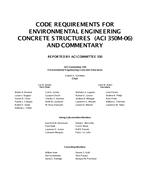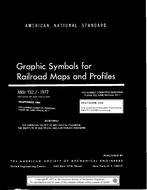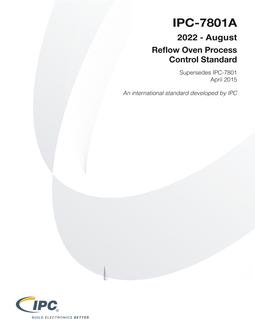ACI 350M
$112.00
Metric Code Requirements for Environmental Engineering Concrete Structures & Commentary
| Published by | Publication Date | Number of Pages |
| ACI | 09/01/2008 | 485 |
Description
ACI 350M – Metric Code Requirements for Environmental Engineering Concrete Structures & Commentary
The code portion of this document covers the structural design, materials selection, and construction of environmental engineering concrete structures. Such structures are used for conveying, storing, or treating liquid or other materials such as solid waste. They include ancillary structures for dams, spill-ways, and channels.
They are subject to uniquely different loadings, more severe exposure conditions, and more restrictive serviceability requirements than non-environmental building structures.
Loadings include normal dead and live loads and vibrating equipment or hydrodynamic forces. Exposures include concentrated chemicals, alternate wetting and drying, and freezing and thawing of saturated concrete. Serviceability requirements include liquid-tightness or gas-tightness.
Typical structures include conveyance, storage, and treatment structures.
Proper design, materials, and construction of environmental engineering concrete structures are required to produce serviceable concrete that is dense, durable, nearly impermeable, and resistant to chemicals, with limited deflections and cracking. Leakage must be controlled to minimize contamination of ground water or the environment, to minimize loss of product or infiltration, and to promote durability.
This code presents new material as well as modified portions of the ACI 318M-02 Building Code that are applicable to environmental engineering concrete structures.
Because ACI 350M-06 is written as a legal document, it may be adopted by reference in a general building code or in regulations governing the design and construction of environmental engineering concrete structures. Thus, it cannot present background details or suggestions for carrying out its requirements or intent. It is the function of the commentary to fill this need.
The commentary discusses some of the considerations of the committee in developing the ACI 350M Code, and its relationship with ACI 318M. Emphasis is given to the explanation of provisions that may be unfamiliar to some users of the code. References to much of the research data referred to in preparing the code are given for those who wish to study certain requirements in greater detail. The chapter and section numbering of the code are followed throughout the commentary. Among the subjects covered are: permits, drawings and specifications, inspections, materials, concrete quality, mixing and placing, forming, embedded pipes, construction joints, reinforcement details, analysis and design, strength and serviceability, flexural and axial loads, shear and torsion, development of reinforcement, slab systems, walls, footings, precast concrete, prestressed concrete, shell structures, folded plate members, provisions for seismic design, and an alternate design method in Appendix I. The quality and testing of materials used in the construction are covered by reference to the appropriate standard specifications. Welding of reinforcement is covered by reference to the appropriate AWS standard. Criteria for liquid-tightness testing may be found in 350.1.
Product Details
- Published:
- 09/01/2008
- Number of Pages:
- 485
- File Size:
- 1 file , 3.1 MB
- Note:
- This product is unavailable in Russia, Ukraine, Belarus





